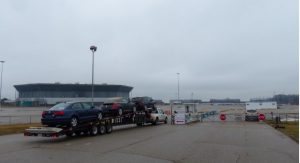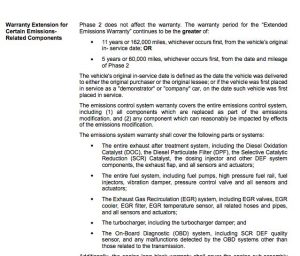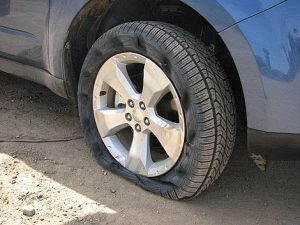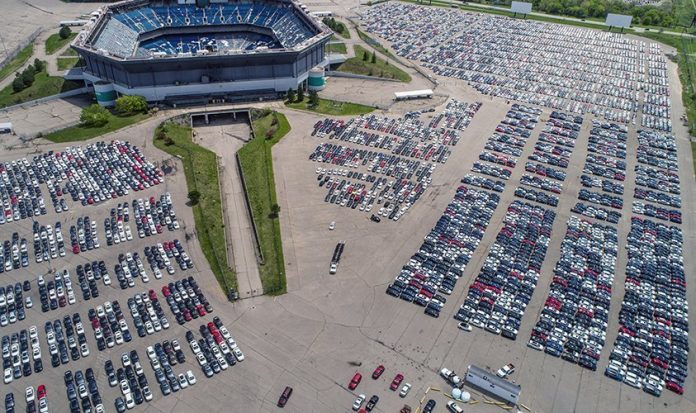A four-wheeled Shawshank Redemption is under way. About 240,000 wrongfully convicted diesel-powered VWs are about to be paroled. The doors of their cells open; the harsh light causes them to blink their eyes. Some are brand-new 2016 and 2017 models that were never sold; others are older models that were – and then bought back by VW after the “cheating” scandal broke.
They’ll be released for sale at VW stores around the country – with luck, one near you.
All have been “fixed” – their computers reprogrammed or other adjustments made to make them Uncle -compliant. This also means they’re less fuel-efficient than pre-fix. Apparently, part of the reason being that to achieve Uncle-compliance, some of the cars require a “trap” to sequester oxides of nitrogen (NOx) emissions – the main issue with regard to the “cheating” – and this in turn requires the engine to run a little richer (more fuel in the air-fuel mix) and that results in lower NOx emissions . . . at the cost of lower MPGs.
Others have merely been “reprogrammed.”
Still, these cars are much more fuel-efficient than anything else on wheels that isn’t on two wheels – or a hybrid.
You may not see the north side of 50 MPG – as several TDI-powered cars, like the Jetta and Golf and Beetle were capable of delivering. But mid-high 40s is still exceptional – particularly when you take into account the inherently superior longevity of a diesel engine vs. a hybrid’s powertrain, which includes a battery pack that will inevitably become less efficient over time (due to discharge/charge cycling) and because of that, less fuel-efficient as the gas-side of the hybrid powertrain assumes more and more of the workload of propelling the car.
Besides which, the still-new VWs (which are two or three years old at this point in terms of the calendar/model year – but haven’t got any miles on them and may even still have the plastic on their seats) will cost less than a new hybrid because they aren’t new – in terms of the calendar/model year.
This is a Haley’s Comet kind of situation. You have the opportunity to buy a brand-new car (the sticker may still be on the side glass) for 20-30 percent less than its sticker price when new.
Not because of the “cheating” – but because of depreciation. Which (usually) has nothing to do with what’s under the hood and everything to do with the year. Most cars lose about 10 percent of their new car value for each year they’re no longer new – even if they don’t rack up many (or in this case, any) miles.
So, they’ll be discounted.
And warranted. The bought-back ones, too.
A better warranty than they originally came with.
VW just announced it will include an 11-year/162,000 mile extended warranty on the affected (and modified) fuel system parts, effective from the date of the “fix.”
See here for details.
But is there anything you ought to be concerned about – other than being politically incorrect for even considering one of these just-awful diesel-powered cars?
Yes, but neither have anything to do with these cars being diesel-powered. That business about them being “dirty” is a bogey. It was confected (and grossly exaggerated) to put affordable, extremely economical diesel-powered cars out of business so as to make room for unaffordable electric cars – which are being forced down our throats because they have to be.
People bought diesels freely – no subsidies or mandates necessary. A real problem for the EV Agenda. But that’s a separate rant… .
With regard to the no-longer-exactly new (but never used) 2016-2017 models, the main potential issue isn’t even with the car. It’s with the tires. Which may be flat-spotted from all that time spent sitting in limbo outside the Silverdome (one of the places of exile that the cars were sent to while the scandal played itself out). There’s a date code on the sidewall, but the main tell is vibration through the steering wheel or generally.
If you notice anything like that, it is almost certainly the tires – assuming it’s an otherwise new car. Ask the VW store to replace them as part of the deal. Probably many have already done so in anticipation of this issue coming up.
The same issue can, of course, affect actually used cars – and maybe harder to diagnose because in addition to just-sitting, the used TDI VWs – the “bought back” cars – were driven, have miles on them. That means wear and tear. And as with any used car, these cars will have individual wear and tear based on individual use. Some will have more miles than others; some will have been better maintained than others. All the usual rues of used car shopping apply (my book, Don’t Get Taken for a Ride, gets into all of this; download it for free here).
With either the new (but nor used) and also the used (and actually used) cars, it’s sound policy to have all the critical fluids (oil, engine coolant, brake fluid) changed out because these do degrade over time – or become contaminated over time – even if the vehicle isn’t driven.
But otherwise? This will literally be your last chance to buy an affordable, high-mileage and long-lived diesel-powered car. They have been fatwa’d out of existence on the new car market – just about (Chevy still sells a diesel-powered version of the Cruze sedan; Mazda was talking about bringing its Sky-D diesel engine to the U.S. but this looks increasingly unlikely due to political considerations).
It will absolutely be you last opportunity to buy a brand-new one for 20-30 percent less than it stickered for when new.
Better hurry.
. . .
Got a question about cars – or anything else? Click on the “ask Eric” link and send ’em in!
If you like what you’ve found here please consider supporting EPautos.
We depend on you to keep the wheels turning!
Our donate button is here.
If you prefer not to use PayPal, our mailing address is:
EPautos
721 Hummingbird Lane SE
Copper Hill, VA 24079
PS: Get an EPautos magnet (pictured below) in return for a $20 or more one-time donation or a $5 or more monthly recurring donation. (Please be sure to tell us you want a sticker – and also, provide an address, so we know where to mail the thing!)
My latest eBook is also available for your favorite price – free! Click here. 












I still like the idea of reviving diesel-powered vehicles, and will probably buy one as a second vehicle. My dad had his 1982 Mercedes diesel until age 30, so I think having one of these around may last beyond the electric car era that’s heading downhill like a Kenworth T-8000 toward us.
I own a 2012 Passat TDI that was part of the shit storm. Had the fix, and then had it reprogrammed and deleted at a performance shop. I’m gonna look for one of these new ones.
[Yawn]- They’d have to mark ’em down a lot more than 20-30% to get me interested and/or extend the entire bumper-to-bumper warranty, ’cause VWs are very expensive to repair; have a lot of electrical problems; their automatic trannies SUCK ass (as far as durabilty- Not that i’d want an automatic); Not just tires and fluids, but major seals are going to be a problem, with the cars having sat for so long unused- as are rust issues- so these things are going to be bigger turds than VWs even normally are- and being already several model years old, these suckers are going to depreciate like doggie doody on Los Vegas sidewalk in July- likely even a week after ya buy one.
These “diesels”, like all the current diesels in pick-ups, etc. other than getting slightly better mileage than a gas version, don’t really have the advantages of a REAL diesel- i.e. the old non-electronic injection-pump simple bulletproof diesels of yore- which kinda negates the whole idea behind buying a diesel.
These aren’t the diesels that last forever. Yeah, the physical engine might…but all of the crap that makes it work, and the car around it, won’t last that long. Think about it; how many old VWs- TDI’s or otherwise, do you see running around? (Of the modern variety- not speaking of the classic ones).
Buying a 3 year-old “new” VW at say 25% of original sticker, would not be such a wise financial move- as the depreciation; cost of maintenance and repairs; higher cost of diesel vs. gas for only slightly better mileage; etc., will negate any fuel savings, and then some and then some.[‘some’ =’much more” actually]
Agree with your entire post Nuncio,unless they’ve greatly improved their electronics and their 100,000 mile auto tranny’s,these are cars I would avoid.BTDT.My 247,000 mile Lexus LS400 1998 is a far better car than my 100,000 mile constant problem Jetta was.
Yesiree, Fred! Of modern (c. last 20 years) Lexus and Toyotas were pretty much the only choices for long-term durability. Pretty much, most other brands just have gone so far downhill- even ones that made overall decent cars, like Honda, usually have an Achilles heel- like weak transmissions.
I don’t know what happened to the Germans though! To think what VW, BMW, Mercedes used to make- they were famous for reliability and durability, and holding their value- but now? Pffft! They all make crap. Now their only value is decent handling/performance (while they last), and faux luxury, consisting of plastic and gimmicky electronic conveniences (Just more to break and complicate repairs).
And it seems the only place one sees these cars still running around after the warranties, loans, and status of newness have expired, is in the projects and ‘hoods’. (Seriously! I used to pick up junk cars- and I’d see tons of no-longer-desirable Kraut cars in such places- but rarely anywhere else- because they were so cheap to buy- and the people who’d buy them were clueless about how much they cost to drive)
Hi Eric,
You explained that the “fixed” VWs provide slightly less fuel economy. A lot of us may be more curious about whether the “fix” also results in less performance.
Enlighten us, please. 🙂
If I could, I’d get one and figure out ways to remove/bypass the new stuff, keeping the old around for emissions testing
If VW could reprogram the chip, so can you. Look on the internet for ways to do this. Most likely, somebody copied the “dirty” code from the car pre-fix. You can flash the chip.
Just checked KBB.com and found two 2012 A3s “in my area.” Prices were $10K lower than what Audi paid me for the buyback. Almost makes me want to pick one up.
But then again, been there, done that. It was the right vehicle for me at the time, but since then Colorado has jacked up the taxes on diesel so it’s not as good a deal as it used to be. And there’s the Audi maintenance schedule…
Oh, that picture is making me think of a local oddity.
The old Mitsubishi plant in Normal, IL, sports a sign out front for Rivian, who promises the moon in automated EVs, and simultaneously the output lot was filled to capacity with nothing but VW diesels, presumably staging them (it has its own rail siding, and is near three interstate highways and two US routes, and Rivian sure as hell isn’t actually *making* anything).
Something profound could be felt stirring in the gut when a two-to-four locomotive auto carrier train would be stopped and loading or unloading, the big diesels idling with visible heat haze above them, the tech-styled Rivian sign in the foreground. Wish I’d gotten a picture, but I always wanted to just drive on by instead of stopping.
Is there some way to quietly undo the “fix” that screws up the engine?
There is always a way and most likely it’s a simple ECU tune. It’ll probably cost a couple hundred and give you more power along with the MPG bump.
And putting in a different tune will void the 11 year 162,000 mile warranty.
But remember, that warranty is only on the fuel system…..
So let me get this straight. The diesel cars were “dirty” and had to be fixed. The “fix” involved more fuel being consumed. Now maybe im the idiot to think this – but as more fuel goes in, im assuming in one way or another, more stuff will come out of the system…..
But as all the boxes are ticked now they are “green” and uncle approved….. a typical bureaucrats solution to a problem (that never existed).
Just like adding an air compressor to the exhaust when all this started.
More fuel burned=less pollution.
The wonders of newthink.
Don’t ever apply for a job working for da gummit, Nasir. Your brain just does not work like a gummit dweeb’s MUST work to remain so employed.
You have precisely nailed the root of the issue. If NOX is point four percent higher in parts per million in economy mode, but the car uses thirty percent less fuel per mile, the reduction in NOX per mile driven is several multiples of the theoretical reduction in EPA mode…… this whole thing is and has been a sick scam.
Its all a matter of “optics” to use the current term of choice to indicate the game of charades these summit poohbahs force upon us.
WHERE in the Constitution do FedGov get ANY authority to deal with what we drive, or “the environment”, or any other such thing. Government control over priveate means of production is, by defintioin, FASCISM. And rthat is what THIS debacle is.. government control of provate means of production.
“WHERE in the Constitution do FedGov get ANY authority to deal with what we drive, or “the environment”, or any other such thing.”
You are, of course, absolutely correct. Unfortunately, the pragmatic truth of the matter is that we live in post-Constitutional America. The Constitution? It’s a dead letter, gone, zip, zilch, nada, finito. All those dead soldiers in Arlington Cemetery? Whatever they died for, it was not enough to save the Constitution. If adherence to the Constitution were against the law, there is not a court in existence that could get enough evidence to convict the US government.
I deeply wish it were not so, but honestly, look around and tell me if I am wrong.
Jason, as Howard Cosell was fond of saying: “That is precisely correct”.
Every government program always accomplishes the exact opposite of what it’s stated purpose is. In this case, the various collection of programs to “reduce foreign oil dependence and emissions” has forced Americans into driving full-size pick-ups, SUVs, and crossdressers, because they essentially outlawed the full-size cars most people wanted to drive (And back before Uncle got into the act, those cars were pretty fuel-efficient, because they were simple and unladen).
Or, just like Uncle’s safety mandates are resulting in cars which are more likely cause accidents, because visibility from them is so poor, and there are now so many things to distract drivers, and to make them “feel” safer……
Nunzio,
“safety mandates are resulting in cars which are more likely cause accidents, because visibility from them is so poor,”
5 bus stop accidents so far this week.
Funny you wrote this article. My Lexus ES300 had to to to the garage because the thing wouldn’t start. I could not locate anything like a coolant level sensor, which would be something that would prevent the engine from starting. I am beginning not to like this car. To make a long story short, I treaded my way to the VW store. I tested Passats. One with the 2.5L and one with the TDI. The TDI had the emissions modification. The good news is that the EPA gas mileage rating is no different from what it was before. 30/42. The Passats had the DEF with selective catalytic reduction already installed. It was a minor programming change for that car. The Jettas were more severely affected by the programming and emissions change as their engines did not have the hardware installed.
I wanted to test the manual, but they did not have one. I doubt more than 500 or so manuals were probably ever built.
As for the road test on these cars… Both the 2.5 and the TDI had similar handling characteristics. They both had a stiff set of leg muscles. Both could corner, although at the limit, the front end would wash out through a tight highway entrance ramp curve. The road noise in both cars was moderate with tire noise intruding in on the passengers. The ride was solid and the highway stability very good to excellent. Both engines were quiet at all speeds.
The TDI had better low end performance and acceleration. Highway speed performance was strong, although there were flat spots when you attempted to punch the gas. The 2.5 delivered smoother throttle response and was generally pretty tame, though it responded assuredly when punched. Both had a long set of legs for lower RPM highway cruising. In my test, I was unable to test the gas mileage on the TDI, however, the 2.5 began delivering around 22.5 mpg in my test, which was pretty rough.
The salesman that was traveling with me told me to slow down, but i did not listen to him. I was testing the car and I explained that I would test the car under worst case conditions.
As basic transportation, the VWs seem pretty good. I like the 2.5 slightly better than the TDI, although if I could get a stick shift, the TDI might come out ahead. By a hubcap.
I may have to try this again at a different dealer.